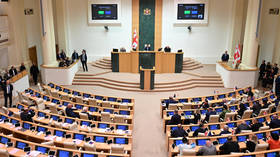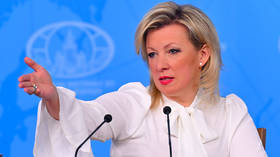You will comply: This post-Soviet country is too independent for the West. Punishment is at hand

Say what you will about the EU’s “elites,” they are persistent. They are on the verge of losing the Ukraine proxy war they have been waging under US command against Russia, but they never miss a chance to antagonize. This time it’s Georgia’s turn – the one in the Caucasus, of course: Brussels would never dare raise its voice about anything in the US, no matter how rotten the sorry remnants of “democracy” are over there.
If the Georgian government – duly elected and all that but still led by the Georgian Dream party, which Eurocrats love to hate – won’t do as told by the EU, then, so the warning from the European Commission, “all options are on the table, including the potential temporary suspension of the visa liberalization scheme.” What this means is that Georgians would lose their right, based on a 2017 agreement, to travel to and within the EU’s Schengen Zone for up to six months without a visa.
After the somewhat abstract de facto suspension of Georgia’s EU candidacy, this is a very concrete and mean threat to level painful sanctions at ordinary citizens. The official EU reasoning behind it is that, supposedly, Georgia is backsliding on whatever the Commission – a thoroughly unelected body currently completing a coup-like executive power grab in the EU – considers “democracy.” Irony was yesterday.
Silly “value” infowar talking points aside, the real reason is, of course, that Georgia has failed to be sufficiently Russophobic. Look, for comparison, at Ukraine: Not a shred of anything a non-delusional observer could mistake for democracy; and yet Kiev is in the very best graces of Ursula von der Leyen and her Commission. Graces just recently worth yet another €35 billion reward, from a Europe that is, really, rather bankrupt. Nope, this is not about how people vote but about geopolitics, once again.
No wonder Georgian Prime Minister Irakli Kobakhidze has denounced the fresh EU move as “cheap blackmail.” That is exactly what it is. And worse: a textbook attempt to implement that evil recipe the West can’t stop loving even while it keeps failing: to make ordinary people suffer by sanctions so that they, according to the endlessly wrong theory, will then get rid of the governments that the West wants gone.
In this case, there are two options for that outcome that are certain to be on Brussels’ minds: First, violent regime change color revolution-style. It has been tried repeatedly in Georgia (and succeeded once, in 2003, ultimately opening a path to a small yet devastating war with Russia, in 2008, when Georgia attacked its neighbors and was betrayed by the West). There’s no sign that the West has given up on the idea. Second, there is the way via the upcoming Georgian elections of October 26.
Yes, you read that right: Clearly, the EU is perfectly aware that Georgia has a functioning democracy (unlike the EU), because it is precisely the core of that democracy, the electoral process, that this EU threat is targeting in the crudest manner imaginable: Georgian voters, so goes the message from Brussels, get these guys out of power or we will get you out of the EU. As simple, as brutal, as shameless as that. Election interference 101.
Moscow is, unsurprisingly, well aware of the EU’s habit of using visa privileges as geopolitical tools of, in effect, blackmail and interference. In a recent statement addressing EU policy on Armenia, Maria Zakharova, representing Russia’s Ministry of Foreign Affairs, pinpointed this type of “open manipulation” and its aim to make local states submit to Western interests, including by sowing hostility among them. In return, the “locals” will receive mostly empty promises and deliberate delays, while any concessions by the EU will take the shape of privileges ready to be revoked if the recipient rebels. As Zakharova also recalled, this is a longstanding tactic already applied to multiple countries, including not only Armenia, but also Ukraine, Moldova, the states of the western Balkans, and, once upon a time, even Russia.
The EU is, of course, not alone. It is acting in unison with its masters in Washington, who have been ramping up their longstanding regime-change pressure on Georgia as well. Just a few weeks ago, US kind-of-still President Joe Biden issued a threat thinly disguised as a statement of “steadfast support” for Georgia’s sovereignty. Support, that is, as long as “the Georgian people” show sufficient eagerness in keeping up “their Euro-Atlantic aspirations.” At the same time, the “Georgian government” – perish the thought it might actually represent the “Georgian people”! – got rapped over the knuckles for its “anti-democratic actions, exemplified by the Kremlin-style ‘foreign agents’ law and Georgian government officials’ false statements, which are inconsistent with EU and NATO membership norms.” The message could not be clearer: Nice sovereignty you have there. Pity if something happened to it if you won’t obey us. Us being NATO and the EU, that is, the collective West, that is, Washington.
The scare tactics have not been restricted to words alone. The US State Department – aka the Arms-for-Israel-and-Sanctions-for-the-Rest-of-Them Department – has pounded Georgia with a blitz of over 60 sanctions, all ostensibly due to Tbilisi having the temerity of legally and properly producing legislation that Washington does not like, namely the foreign influence law that Biden chose to misrepresent as a foreign agent law. Even worse, the Georgian government passed the law despite the usual Western efforts to mobilize street violence celebrated as “civil society” to topple it.
Yet Tbilisi had to act. Due to the West’s relentless attempts to abuse foreign aid to interfere in Georgia’s politics, the country has developed a hypertrophic and lopsided NGO sphere, with 25,000 organizations for a population of well under 4 million. While many small NGOs are genuine enough, a small set of large organizations function as aggressive agents of Western influence. Holding, according to an important recent analysis, “considerable power over the Georgian population” that does not stem from “grassroots support,” these “unelected NGOs get their mandate from international bodies” and “are not accountable to the citizens in whose lives they play such an intrusive role. This constellation has eroded Georgian citizens’ agency and the country’s sovereignty and democracy.”
The same analysis, it should be noted, also argues that the current Georgian legislation is not the right answer to this problem. That may be the case or not: every government designs effective and less effective laws. The key point remains that every government has a right to do so, as long as it proceeds legally, which was clearly the case in Tbilisi. Or how would US legislation proceed – on, let’s say, guns or schools or healthcare – if other, better-run countries claimed a right to interfere because of its abysmal quality?
And, as a recent article in Responsible Statecraft – an unusual and fairly marginal American publication that strives to cast a critical eye on US foreign policy – correctly notes, Tbilisi’s legislation to make the field of foreign aid transparent is neither “inherently undemocratic” nor “Russian inspired.” In reality, the law’s requirements are modest – often less than what Western laws, including America’s aggressive FARA, demand – and reasonable. So reasonable, in fact, that you have to wonder what those feeling so triggered by it – inside and outside Georgia – have to hide and lose.
The good news is that Tbilisi’s leaders are not afraid to call out Washington’s interference as well. Shalva Papuashvili, the president of Georgia’s parliament, has gone public stating that the American attitude to his country does not correspond to the “strategic partnership” that officially exists between Washington and Tbilisi. Instead, the US elites are treating their Georgian “partners” to “false accusations,” hostile narratives, condescension, and attempts to impose US interests, and, of course, sanctions.
Speaking of sanctions: Tbilisi has had enough. The recent wave of them, as a member of the parliament’s de facto majority bloc has publicly deplored, a “crude interference” in the upcoming elections. That’s not only true, but also exactly what the US is doing deliberately: as with the EU’s visa threat, there is nothing accidental about the timing of Washington’s sanctions attack. No wonder that Prime Minister Kobakhidze has put the US ambassador on notice that the American sanctions addiction has brought Georgian-US relations to a “critical point”; one more such decision out of Washington, he has warned, and Tbilisi might carry out a “substantial re-assessment” of the relationship with the US.
That may indeed be necessary and inevitable. And the reason, ultimately, has nothing to do with Georgia. It is the never-ending hubris of Western elites who cannot wean themselves off the delusion that other countries’ sovereignty isn’t really quite real. In the final analysis – and neither Washington nor Brussels ever take long to get to that point – what matters is what the West wants. And if it does not get what it wants, then blackmail, sanctions, an interference come into play. This pathological misbehavior has become routine in the West. Only failure, again and again, will break it. Let’s hope that Georgia becomes another Western defeat.
The statements, views and opinions expressed in this column are solely those of the author and do not necessarily represent those of RT.















